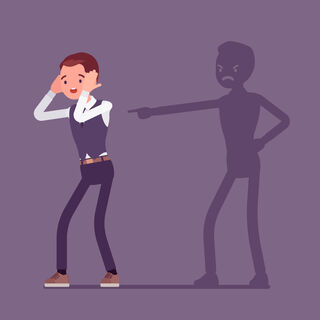Sex
The Critic in Our Heads: The Neocortex
The neocortex has created serious problems for human sex and desire.
Posted November 12, 2021 Reviewed by Tyler Woods
Key points
- The human neocortex was an extraordinary evolutionary development that helped our foraging ancestors survive.
- However, freed from having to focus on survival, the cortex has created unintended consequences and other problems for human beings.
- Many of the problems people have with sex and desire today are the result of the cortex getting in the way of pleasure.
- Can we learn to not identify with the critic that lives in our heads?
In the first blog in this series, we quoted this passage from Joyce Carol Oates’ novel, Unholy Loves:
Making love with him in the customary dark, she had often thought, though every instinct in her tried to forbid the thought, that she was at such times only a physical stimulus for him.

The character’s mind is ruining her experience. Her experience of sexuality takes place in a mental environment dominated by self-consciousness and uncertainty. It’s interesting that Oates doesn’t ask why her heroine is worried that she’s “only” a physical stimulus for her partner. Why should she be more? What would “more” be like? Why can’t the experience of sex simply be pleasurable? The cortex, that gerbil on a wheel, keeps interfering with the character’s physical responses.
Ask someone who they are or what they’re like and he or she will most likely talk about some feature of themselves that is primarily cortical. “I’m a good person” is a likely answer. So is, “I’m a hard worker.” Very few people will say, for example, “I am a person with good digestion,” or, “I am a person with a terrific immune system.” You’ll never hear “I am a mammal,” or, “I am a primate,” even though we humans are classified as one of the great apes. You might hear someone say “I’m a good lover.” But such an answer has more to do with comparison and competition than with a delight in sensuality.
In The Cerebral Cortex: The Programmable Organ, we suggested that there is an inner environment in which the mind is pitted against natural impulses because culture has programmed the cerebral cortex to do so. Just how alien an environment the cortex can create is epitomized by the recent book, The Tragedy of Heterosexuality (Ward, 2020). The author’s cortex is condemning heterosexuality, a natural phenomenon that has been a crucial feature of life on earth for millions of years. To be sure, no one has to accept the author’s view of sex, but the view is spreading, and we have to live and make whatever love we can in an environment which includes this kind of thinking.
The conflict between the cortex and sex began when organized religion turned sex into sin. In the process, the cortex created a new environment for sex, one that is rife with guilt and fear. Fear has its place. People should be afraid of lions and wolves, but did the human species really need to create an environment in which young people fear their own sexuality and feel guilty if they indulge? That was certainly not the environment our hunter-gatherer ancestors lived in before agriculture, large societies, and a cortex unfettered by the demands of survival. Among contemporary hunter-gatherers, sex isn’t something that can get you consigned to Dante’s second circle of hell. Adults tell jokes about it, premarital sex is common, and in some cases, even extra-marital affairs don’t cause lasting upheaval and permanently ruined reputations.
The opening lyrics to an old Broadway song, "Where is Your Heart"[1], reveals the influence of the cortex as it intrudes on sex and desire:
Whenever we kiss
I worry and wonder
As Sigmund Freud pointed out, the three killjoys—doubt, fear, and uncertainty—certainly play a role in such maladies as premature ejaculation, impotence, and frigidity. While organic factors account for some instances of these conditions, many are the result of mental issues—associations and memories which snatch the mind away from the partner and the pleasure.[2]
Can we learn to ignore the critic in our heads?
References
Ward, Jane. 2020. The Tragedy of Heterosexuality. New York: New York University Press.
[1] by William Engvick & Georges Auric
[2] As indicated by the fact that cognitive behavior therapy (CBT) rather than a medical intervention is frequently the recommended treatment for such conditions


